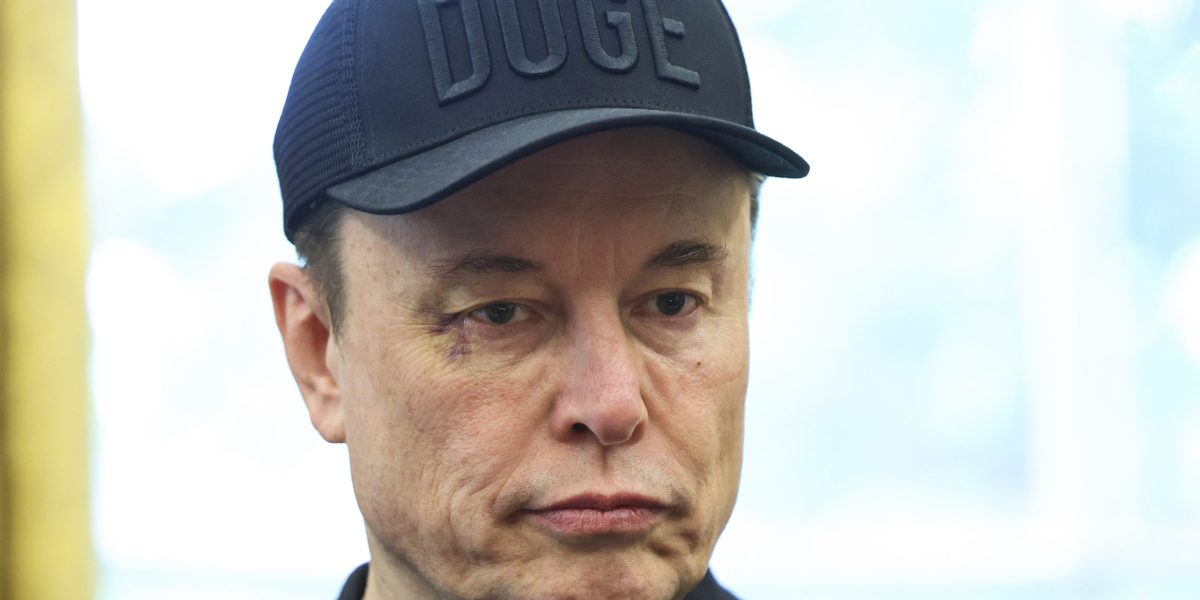
Yale study finds Tesla lost more than 1 million U.S. sales because of Elon Musk’s political agenda
At the beginning of the year, Tesla investors pleaded with CEO Elon Musk to take a step back from his new role as the leader of President Donald Trump’s Department of Government Efficiency (DOGE) and give more attention to the ailing EV company. A new study from Yale University economists suggests those investors were right to worry.
A working paper issued this month found Musk’s “polarizing and partisan actions” over the past three years cost Tesla between 1 million and 1.26 million vehicles in U.S. sales, while boosting the sales of its EV competitors by 17% to 22%.
Musk’s partisan playbook didn’t begin the conversation around how CEOs should engage in politics, but his business prowess and deep ties with the Trump administration make Musk and his companies a compelling case study, according to Kenneth Gillingham, a professor of environmental and energy economics at Yale and the study’s lead author. While many CEOs refuse to speak out against Trump for fear of retaliation—and others like Apple’s Tim Cook pledge to accommodate the president’s trade policies—there’s bound to be impacts on these leaders’ businesses, Gillingham told Fortune.
“It’s very useful to look at this very prominent case of the wealthiest person in the world and their very strong political action,” he said.
By the end of 2020, Tesla surged into the S&P 500 as the rest of the auto industry stumbled during the pandemic, establishing itself as an industry leader. But in October 2022, Tesla was slashing prices as it struggled to meet delivery targets, ailments that coincided with Musk’s decision to purchase Twitter, which later became X, for $44 billion, a move Dan Ives, Wedbush Securities analyst and longtime Musk supporter, called “one of the most overpaid tech acquisitions in history.” Two years later, the value of the platform would be worth only 25% of what Musk paid for it.
As X hit snags, Musk began pouring money into supporting the election of Trump and other conservative candidates to the tune of at least $132 million in campaign donations. Following Trump’s inauguration, Musk picked up the mantle as head of DOGE, further ingratiating himself to the president, even as analysts warned the move could alienate Tesla’s consumer base of historically left-of-center, environmentally conscious buyers. As of April, Tesla saw its first annual sales drop in over a year, even as competitors like Toyota and Honda surged in the EV space.
Tesla did not immediately respond to Fortune’s request for comment.
Calculating Musk’s impact on Tesla sales
To accurately measure the impact Musk’s political and controversial decisions had on Tesla, researchers broke down sales between 2020 and 2025 by U.S. counties, looking at vehicle registration data in predominantly Democratic versus predominantly Republican areas of the country.
In heavily Democratic areas of the country, Tesla sales rocketed from 2020 through most of 2022, up until Musk acquired X, at which point sales began decreasing. However, researchers found the sales of EVs and hybrid cars in these left-leaning parts of the U.S. continued to tick up, indicating the slowing purchase of Teslas wasn’t a result of poor EV demand, but rather a decision from Democrat-heavy areas not to purchase Tesla vehicles specifically. In Republican-leaning areas, EV sales were flat. Researchers were able to extrapolate sales data from those models.
A study published in Nature in July supports this study’s findings. Surveying 633 U.S. adults about their intention to buy an EV, researchers from the Williams College–led study found that conservatives consistently did not favor buying EVs, Tesla or otherwise, regardless of how they felt about Musk. Meanwhile, liberals had lower purchase intentions for Tesla vehicles than for other EVs, with lower purchase intentions associated with negative perceptions of the Tesla CEO.
‘CEO activism’ gone wrong
At the foundation of Gillingham’s study is the idea of “CEO activism,” or how a leader chooses to speak out or act on issues outside of matters directly related to their business.
“There’s always been a debate about whether CEOs should really be silent on political things, or should really lean into politics,” Gillingham said.
It isn’t just academics who noted this pattern. In July, Wedbush analyst Ives outlined a three-point plan for Tesla’s board to rein in Musk, proposing the board limit the amount of time Musk spends in the political world, as well as set up an oversight committee for the CEO’s political ambitions.
“Some general guardrails on this front would help everyone involved, including institutional investors, retail investors, Musk himself, the board, and Tesla employees around the world,” Ives said in a note to investors. “The board cannot control Musk’s donations … but they can have oversight if his political ambitions/endeavors interfere with his role as CEO of Tesla.”
For other CEOs concerned about how to manage political endeavors while running a company, Gillingham had a simple piece of advice: “The easiest thing to say is, don’t antagonize your core customers.”
First Appeared on
Source link






